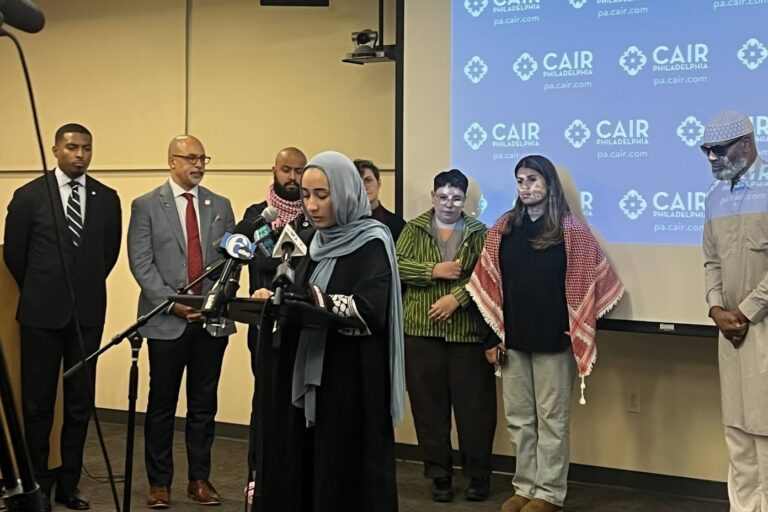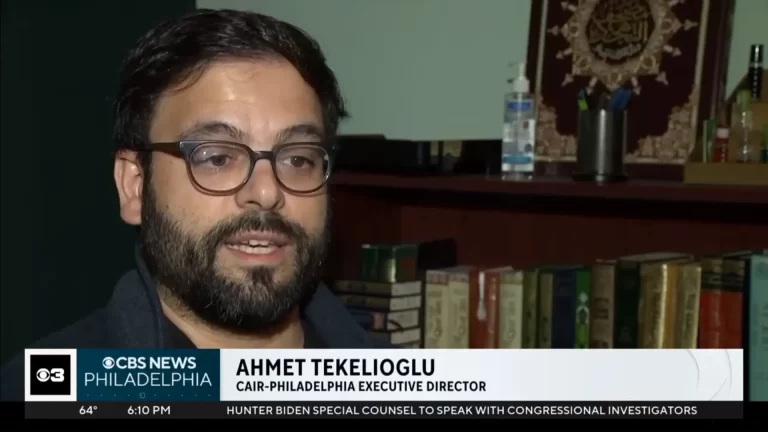![]()
by Alfred Lubrano
Philadelphia Inquirer
Amid the din of a meat-cutting machine quartering a lamb carcass at Al Aqsa Halal Meats in the Northeast on Monday afternoon, store manager Ray Hamidah shared a thought about his adopted country:
“A bullet in Osama bin Laden’s head was something the American people needed. Revenge relaxes people.”
A Jordanian-born U.S. citizen, Hamidah, 42, is a pragmatist who saw bin Laden as a “perverter of Islam” who brought pain and prejudice to Muslims in America.
“This will be better,” Hamidah concluded, the fresh lamb being sliced at his butcher counter an apt symbol of springtime renewal. “We’re not celebrating. But this is better.”
Arabs and Muslims in the Northeast as well as in mosques and professional organizations around the city are expressing a sense of relief that Navy SEALs killed the mastermind of the Sept. 11, 2001, attacks early Monday in Pakistan.
Still, the killing has not alleviated the fear that Muslims will long be linked with terrorism and forever viewed with suspicion.
“My main worry is that anybody in the world can do something bad now and people will blame Muslims avenging bin Laden,” said Aeman Ali Mohamad, 26, owner of Safe Side Services, an insurance firm on Wyoming Avenue across from Al Aqsa.
Weary of being associated with terrorism, Mohamad, a North Jersey native, explained his distance from bin Laden. “Al-Qaeda has nothing to do with me, with most Muslims, and I hope they die with Osama bin Laden,” he said. “I feel relief that he’s gone.”
Down the street, it was more of the same at Pizza Point, where manager Mohammed Jubran, 27, bristled that bin Laden “wasn’t good for the Muslims, killing innocent people.”
The Jerusalem-born Palestinian, now an American, spoke as though the constant heat of his pizza ovens scorched his words as he spoke them: “The man deserved to die.”
Along with the businessmen of Wyoming Avenue, the Arab American intelligentsia of imams and advocates in the area detailed their delight in bin Laden’s end.
“As Arab Americans, we’re triply happy,” noted Marwan Kreidie, executive director of the Philadelphia Arab American Corp., a social service agency.
“First, he killed at least 3,000 Americans on 9/11, and we’re glad he got his just due.
“Next, as Arab Americans, we know the vast majority of people killed from his reign of terror are Muslims.
“And third, his actions caused reactions here, making us unfairly targeted – a community under fire.”
Kreidie added that bin Laden’s message of a violent Islamic revolution yanking the world back to the 14th century never took hold among the youth of the Arab world.
The proof has been the so-called Arab spring, in which young revolutionaries have gathered and fought for democracy – not jihad – in Egypt, Libya, and elsewhere.
Moein Khawaja, executive director of the Philadelphia chapter of the Council on American-Islamic Relations, said that as an American and a Muslim, he cheered when he heard of bin Laden’s demise.
“My wife and I were watching the Phillies game where they announced his death,” Khawaja said. “As people at the game chanted, ‘U.S.A.,’ we yelled, ‘We got him!'”
He added, “I never forgot the day our country was attacked so brutally, and at the same time the religion of over one billion people was tarnished.”
Among the religious, a paradox develops around bin Laden’s death.
“I’m not not happy he’s dead,” said Marc Manley, a South Philadelphia imam not associated with any particular mosque. “But I do feel odd about being happy a human was killed. Is it appropriate?”
Manley also wondered what changes would develop from bin Laden’s demise.
“Will we Muslims get screened less often in airports now?” he asked. “Will we not be used as political hockey pucks during election campaigns that include anti-Muslim feelings?”
Manley said he’d like to be optimistic that pressure on Muslims will lessen. “But,” he added, “the cynical side kicks in, and you say, ‘Of course this isn’t going to change everything.’ At least not





